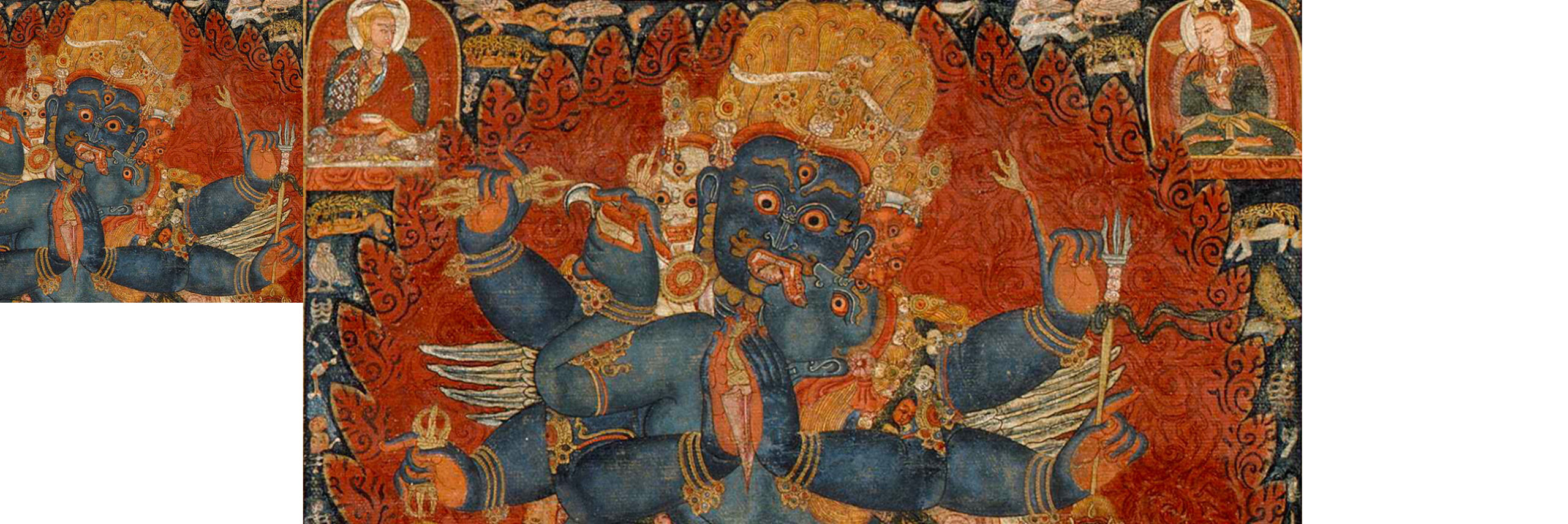
Padmasambhava and Cultural Identity
Padmasambhava Seminar
Sunday, October 14, 2018
11:45 AM–1:15 PM
Presented by Lama Jabb
Discussants: James Gentry and Daniel Hirshberg
Facilitator: Elena Pakhoutova
Padmasambhava’s widely accepted iconic place in Tibetan cultural identity may be traced back to the 12th-century biography of the master compiled by Nyangrel Nyima Ozer, which promoted Padmasambhava as an awakened being who helped establish Buddhism in Tibet. We know little of Padmasambhava’s historical identity in the 8th century, but through these later depictions “Padmasambhava” gradually emerged as a Tibetan cultural product central to Tibetan cultural identity.
This image of Padmasambhava is not without its critics. The contemporary Tibetan author Jangbu in his acclaimed free verse poem Acts of Nyenchen Thanglha ambiguously portrays Padmasambhava and complicates the conventional, clear-cut representation of Padmasambhava as a supreme being who only had Tibetan interests at heart. Instead, his role in Tibet is depicted as an ideological invasion that eventually succeeded in the territorial takeover of Tibetan mountains—the soul of pre-Buddhist Tibet.
In the 16th and 17th centuries, Tibetan doubts about the veracity of the idealized accounts of Padmasambhava’s life became so vocal they prompted a series of apologetic biographies attempting to address such critiques. To inquire into the contested roles of Padmasambhava in Tibetan history and cultural identity, the presenter and discussants use original sources, biographies, contemporary literature, and academic contributions to broadly ponder how dynamic encounters with foreign civilizations have been foundational in the formation of Tibetan culture and remain vital to its survival.
Seminar tickets include admission to the Rubin’s exhibitions, including The Second Buddha: Master of Time.
Support for the seminar was provided by the Chiang Ching-Kuo Foundation for International Scholarly Exchange
About the Speakers
Lama Jabb, PhD, is a Fellow in Tibetan Literature at the University of Oxford’s Wolfson College, Faculty of Oriental Studies. He completed his DPhil on Modern Tibetan Literature and the Inescapable Nation at Oxford University in 2003. He is fascinated by the ways in which both the past and living traditions shape contemporary Tibet. He explores the intertextual nature of Tibetan literature by—among other things—examining the complex interplay between the Tibetan literary text and oral traditions. Lama Jabb also has a keen interest in the theory and practice of translation, produces his own original translations, and writes Tibetan poems. As a Junior Research Fellow, Lama Jabb has been studying the unexplored genre of Tibetan bird stories within its broader cultural framework, focusing particularly on a volume called The Treasury of Intellect: Narrating the Worldly Tale of the Winged Ones. During his current Leverhulme Fellowship at Oxford, he will investigate the interplay between orality and literacy in the genres of spiritual song, poetry, and essay.
James Gentry, PhD, is Professor of Buddhist and Tibetan Studies at the Centre for Buddhist Studies at Rangjung Yeshe Institute, Kathmandu University, Nepal. He received his PhD from Harvard University in 2014 and recently published Power Objects in Tibetan Buddhism: The Life, Writings and Legacy of Sokdopka Lodro Gyeltsen (Brill, 2016).
Dan Hirshberg, PhD, is an Assistant Professor in the Department of Classics, Philosophy, and Religion at the University of Mary Washington in Fredericksburg, Virginia. He earned a doctorate in Inner Asian and Altaic Studies from Harvard University in 2012, and a master’s degree in Indo-Tibetan Buddhism from Naropa University in 2005. He is the author of Remembering the Lotus-Born: Padmasambhava in the History of Tibet’s Golden Age (Wisdom Publications, 2016).
Suggested Readings
Cantwell, Cathy, and Robert Mayer. 2013. “Representations of Padmasambhava in Early Post-Imperial Tibet.” In Tibet after Empire: Culture, Society and Religion Between 850″“1000, Proceedings of the Seminar Held in Lumbini, Nepal, March 2011, edited by Christoph Cüppers, Robert Mayer, and Michael Walter, 19″“50. Lumbini: Lumbini International Research Institute.
Dreyfus, George. 1994. “Cherished Memories, Cherished Communities.” In Tibetan Studies: Proceedings of the 6th International Seminar of the International Association for Tibetan Studies. Fagernes 1992, vol. 1, edited by Per Kvaerne, 205″“218. Oslo: The Institute for Comparative Research in Human Culture.
Hirshberg, Daniel A. 2018. “The Guru Beyond Time: Padmasambhava’s Eight Names and Three Exalted Bodies.” In The Second Buddha: Master of Time, edited by Elena Pakhoutova, 86″“117. New York: Prestel, 2018.
Jabb, Lama. 2011. “The Consciousness of the Past in the Creativity of the Present: Modern Tibetan Literature and Social Change.” International Journal of Asian Studies 8 (1): 89″“95.
Tsogyal, Yeshe. 1993. The Lotus-Born: The Life Story of Padmasambhava. Translated by Erik Pema Kunsang. Boston: Shambhala.
Wangdu, Pasang, and Hildegard Diemberger. 2000. dBa bzhed: The Royal Narrative Concerning the Bringing of the Buddha’s Doctrine to Tibet. Vienna: Verlag der Österreichische Akademie der Wissenschaften.
Willis, Michael. 2014. “From World Religion to World Dominion: Trading, Translation and Institution-Building in Tibet.” In Religions and Trade: Religious Formation, Transformation and Cross-Cultural Exchange Between East and West, 234″“259. Leiden and Boston: Brill.
Ticket per Session: $20.00
Member Ticket per Session: $16.00
Seminar Tickets: $65.00
Seminar Member Tickets: $52.00
Seminar Student Tickets: $25.00
Have any questions? Contact the Museum Box Office at 212-620-5000 ext. 344 or email us at boxoffice@rubinmuseum.org.

